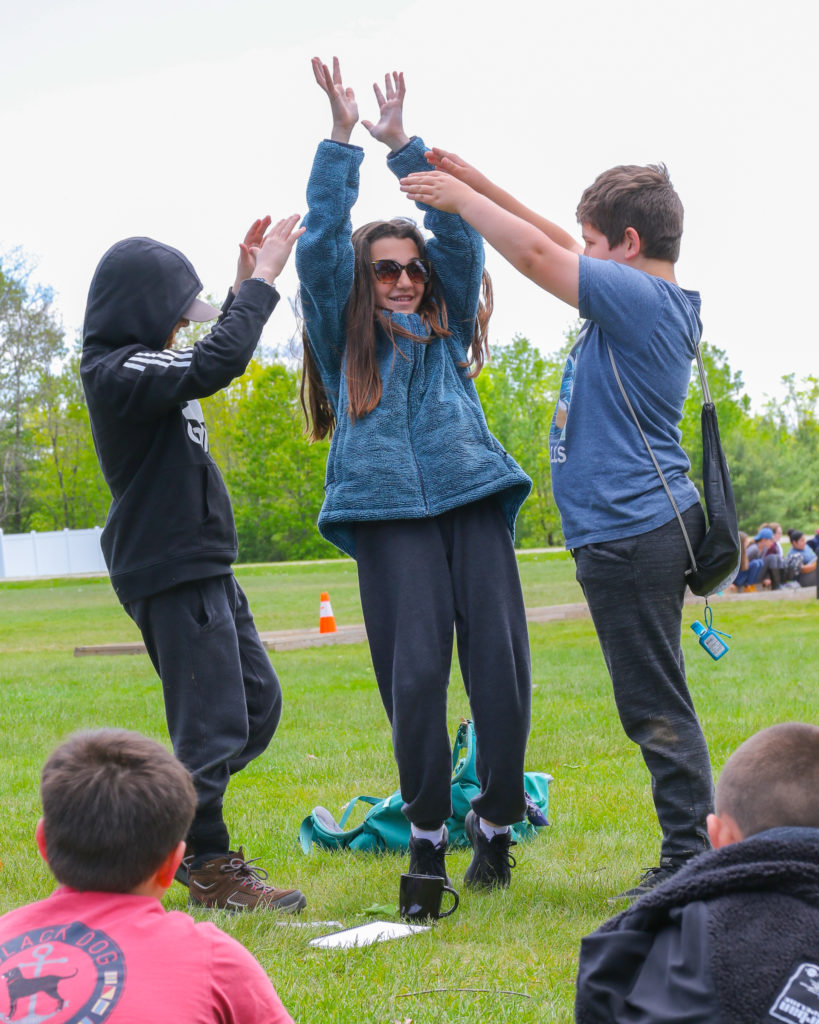“Rock, Water, Glacier, Shift!”

By Nathan Tsukroff
That was the lesson of the afternoon at the Ecology School last week at Poland Spring Resort on Maine Street in Poland, the school’s home for the spring and fall of 2019.
Sixth-grade students from Haverhill, MA spent last week studying agroecology at the expansive resort that has served summer guests for generations. Over 80 students from one school arrived on Monday, with another 60 arriving on Tuesday. They took part in classes through midday on Friday before returning to Massachusetts.
Under the watchful eye of Casey Boland, one of the educators at the Ecology School, a group of the students imagined themselves as magma moving up through a volcano to cool and harden into igneous rock.
They then drew cards to identify themselves as various other types of rock and roamed around the field to connect with fellow classmates of similar rock types.
All of this was to make learning interesting and fun. Rather than just sitting in class, students got to explore the outside world that is full of the objects in their lessons.
The 12 weeks of summer classes were arranged with Cyndi Robbins, owner of Poland Spring Resort, as the Ecology School had to find a temporary home before moving to its recently-purchased property in Saco.
Established in 1998, the school leased property at Ferry Beach in Saco for its spring and autumn classes and purchased the 105-acre River Bend Farm in 2017. Construction and rebuilding of the new quarters is planned through 2019, with the new facility expected to start hosting classes in 2020. The school’s master plan “envisions turning this historic farm into a year-round residential environmental learning center,” according to the Ecology School’s annual report for 2017.
Alexandra Grindle, Director of Programs for the school, said the school plans to conduct classes at Poland Spring Resort “for the next year and a half.”
The school notes that “each year thousands of children and adults explore ecology, outdoor science, and sustainability through our innovative, hands-on, and immersive programming.”
That hands-on learning was clearly part of the education for the students at the Poland Spring Resort.
At the beginning of class time, students were introduced to the class topic through a skit presented by the educators. Students were then split up into small groups and were led across the resort’s campus by individual educators to expand on the lesson.
Educators receive a week of intensive coaching at the school to prepare them for their leadership roles. Many of them have a background in ecology.
Students arrive at the school to stay overnight for up to a week. They have classes during the day and into the evening, with set times for communal meals and a few minutes of quiet time between classes.
Teachers from the schools, along with some parents, also stay at the resort as chaperones. The Poland Spring Resort is a great location for the school, with its large multi-story main building that allows all the students to be housed in the same general area. Meals are enjoyed in the dining room on the ground floor.
While the students “are here learning about the local ecology,” according to Grindle, they can apply their lessons to their own communities. Haverhill, MA, is very similar to towns such as Saco and Lewiston in Maine, with repurposed factories that were once powered by water flowing through canals.
Grindle said the education provided “is a lot about making connections for students between what they’re out and about seeing and what they’re eating at the table, and learning to really appreciate what’s around them.”
“We certainly talk about how to live a sustainable life, but more important, (we) take kids outside, where they’re doing activities and learning about the environment around them and how that connects directly to their life at home,” she said.
Grindle said that while the regular schools have good programs for teaching students, “there is something about the opportunity to be away” from the everyday classroom that takes their learning “to the next level and really lets them engage with one another, with their teachers, and with the environment around them in a different way.”
For the Rock, Water, Glacier, Shift! class, students picked up pieces of mica and learned that it is widely distributed and occurs in igneous rock (hot, molten rock that has crystallized and solidified), metamorphic rock (rock that has been changed due to heat and pressure) or sedimentary rock (rock formed from pre-existing rocks or pieces of once-living organisms).
Boland then brought the students to sand pits used for playing horseshoes and had them build imaginary mountains out of the sand to demonstrate the upheaval between tectonic plates that created the Appalachian Mountains on the east coast of the United States.
For this particular group of students, classes began Monday afternoon with a lesson on the “ABC’s of Ecology,” followed by an evening class on “Nature at Night.” Tuesday started with the “Battle of the Biotic,” then the “Rock, Water, Glacier, Shift!” class, and a Marine Lab in the evening. Wednesday’s classes included lessons on “Tide Pools” at the Biddeford Pools in the morning, “FBI: Maine” in the afternoon, and “Our Place in Space” in the evening. Thursday had classes about “Living on the Edge” in the morning, “Watersheds” in the afternoon, and an Eco Quest in the evening.
The week finished up Friday morning with a class called “The Final Lesson: Ecology is Everywhere.”


